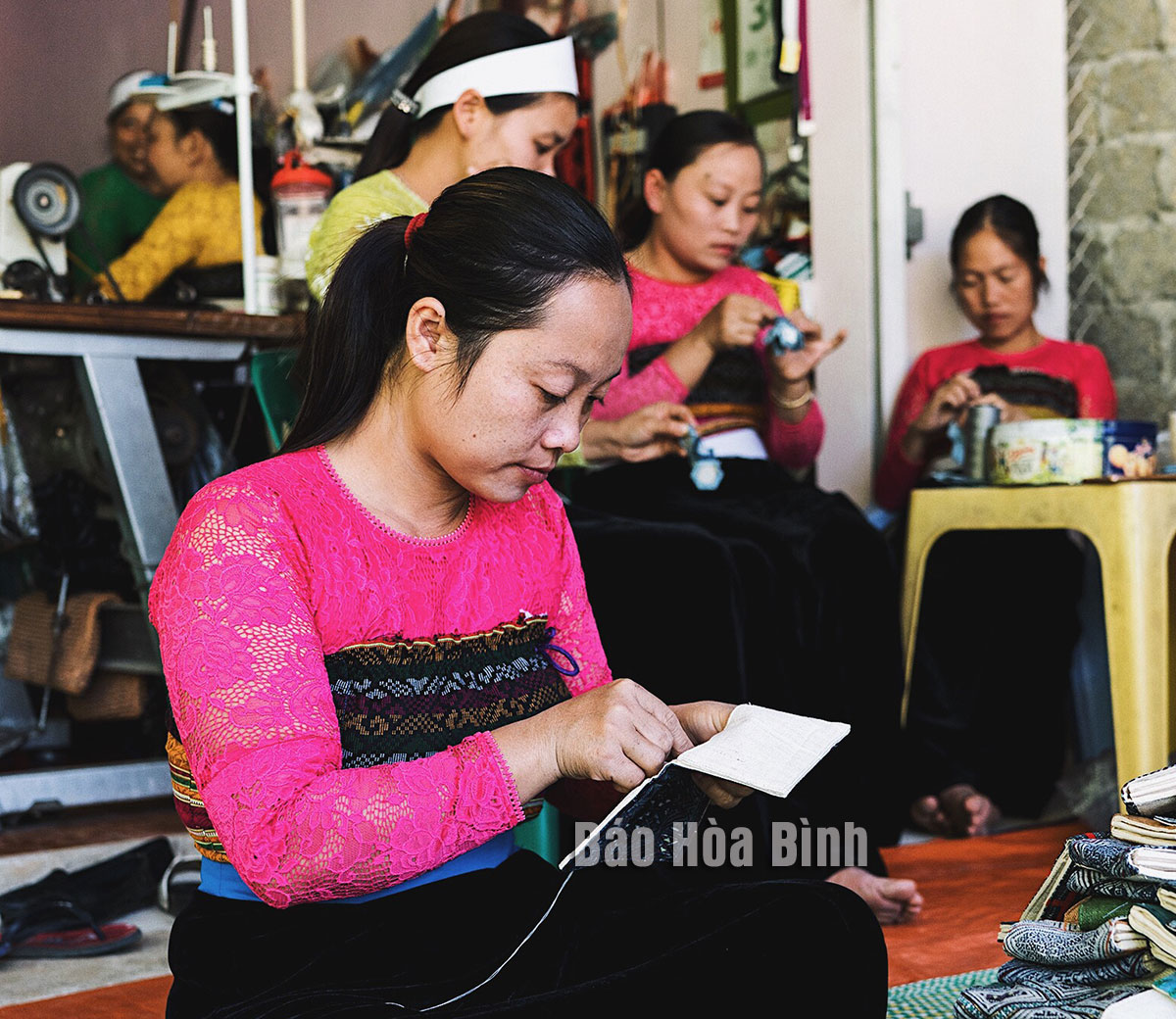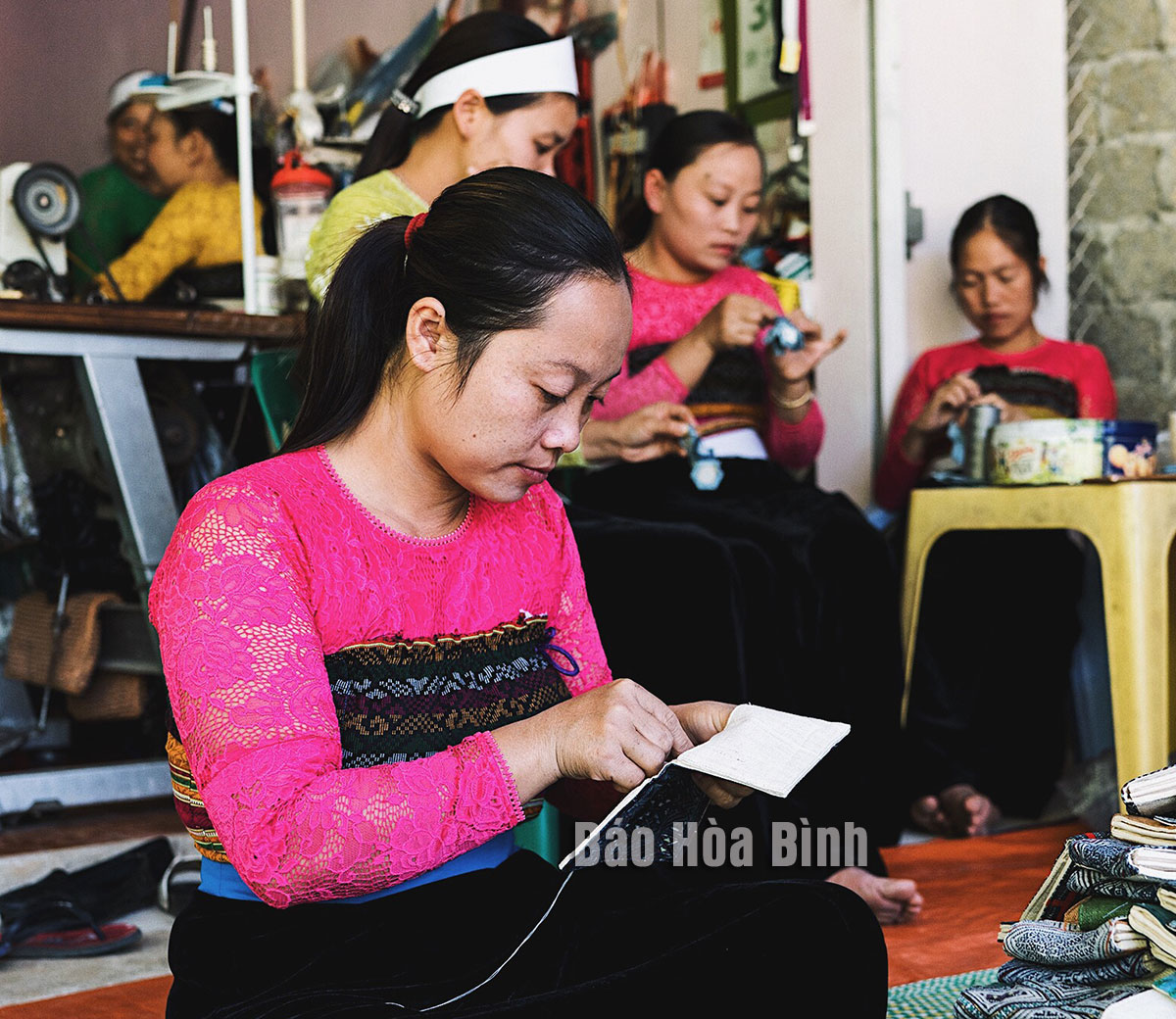
Women in Tong Dau commune, Mai Chau district have jointly opened a cooperative specialising in making brocade products as a way to preserve traditional brocade weaving and increase their incomes.
Members of Tong Dau Cooperative in Tong Dau commune, Mai
Chau district make brocade products.
Mai Chau is a popular tourist attraction in Hoa Binh province offering
community-based tourism, cultural, ecological and resort tourism. It is home to
Thai people with a long-standing culture that can be seen in their lifestyle,
costumes, farming style and stilt houses. Notably, when it comes to the cultural
quintessence of the Thai people, it is impossible not to mention the
traditional brocade weaving.
Recognising the value and significance of brocade weaving in
preserving the Thai culture, women in Tong Dau commune have established the
Tong Dau Cooperative.
Ha Thi Ha Chi, deputy director of Tong Dau Cooperative said that
the cooperative is developing a project on preserving and developing the
traditional weaving and dyeing profession of the Thai ethnic group in a green
direction associated with community tourism in Mai Chau district.
The project will compete in a contest launched by the Vietnam
Women's Union on women's startups and green transformation. It aims to improve
the production capacity of woven and dyed products of the Thai ethnic group,
train local younger generation in traditional weaving and dyeing skills and
develop the market for naturally dyed textile products. Currently, all of the
cooperative's products are sold to organisations and businesses that signed
contracts with the cooperative.
Members of the cooperative have also actively applied
innovations in weaving to perfect their products. Besides skills that the women
learnt when they were little girls, Tong Dau women work hard to create products
that meet consumer tastes today.
The typical characteristic of brocade patterns is the complex
combination of colours without being showy. The main patterns are flowers,
leaves, plants, birds or shapes arranged in a balanced manner according to
rules. Brocade products are used in a variety of ways, from making costumes to
accessories, most commonly handbags. Other brocaded items include wallets,
backpacks, bracelets, and earrings. Brocaded products are also used to make
household items, as dowries for daughters when they get married, and souvenirs
for tourists.
In addition to conventional sale, the cooperative also sells its
products online through its website, social network accounts and e-commerce
platforms such as Shopee and Tiktok.
The cooperative also plans to enter into joint ventures and partnerships
with other cooperatives in Hoa Binh and other provinces to promote its brand.
Lo Thi Thuy, Vice Chairwoman of Tong Dau Commune People's Committee, said that
to enhance the values of local traditional products, the commune authorities
always create favourable conditions for the cooperative to develop its
production and expand market.
With an increasingly vibrant and widespread emulation movement aimed at building cultured residential areas and cultured families, Yen Thuy District has been making steady progress toward improving both the material and spiritual well-being of its people, while fostering a civilized, prosperous, beautiful, and progressive community.
Once lacking recreational spaces and community facilities, Residential Group 2 in Quynh Lam Ward (Hoa Binh City) has recently received attention for the construction of a new, spacious, and fully equipped cultural house. The project followed the model of state support combined with public contributions in both labor and funding.
The "All people unite to build cultural life" movement, which has been effectively integrated with Kim Boi district’s socio-economic development goals, is fostering a lively spirit of emulation across local residential areas, hamlets, villages, public agencies, and enterprises. In addition, through the initiative, traditional cultural values are being preserved and promoted, while community solidarity and mutual support in poverty reduction and economic development are being strengthened.
A working delegation of the Hoa Binh provincial People’s Committee led by its Permanent Vice Chairman Nguyen Van Toan on June 11 inspected the progress of a project to build the Mo Muong Cultural Heritage Conservation Space linked to tourism services in Hop Phong commune, Cao Phong district.
Born and growing in the heroic land of Muong Dong, Dinh Thi Kieu Dung, a resident in Bo town of Kim Boi district, in her childhood was nurtured by the sweet lullabies of her grandmother and mother. These melodies deeply imprinted on her soul, becoming an inseparable part of her love for her ethnic group's culture. For over 20 years, this love for her hometown has driven Dung to research, collect, and pass down the cultural values of the Muong people to future generations.
In the final days of May, the Ethnic Art Troupe of Hoa Binh Province organized performances to serve the people in remote, mountainous, and particularly disadvantaged areas within the province. These were not just ordinary artistic shows, but they were the meaningful journeys aimed at spreading cultural values, enhancing the spiritual life of the people and contributing to the preservation of ethnic minority cultural identities.



